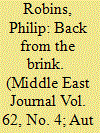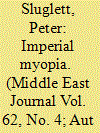|
|
|
Sort Order |
|
|
|
Items / Page
|
|
|
|
|
|
|
| Srl | Item |
| 1 |
ID:
092626


|
|
|
|
|
| Publication |
2008.
|
| Summary/Abstract |
This article focuses on the issue of narcotics and Turkey over a 30-year period. Its point of departure is the 1970s, when the opium production crisis in Turkey, and its associated corrosion of relations with the US, had been brought to an end. The article concentrates on the period in the late 1980s/early to mid-1990s, when the hard drugs issue became fused with other security threats like terrorism and state corruption. During this dark period, Turkey's criminal organizations that were trafficking narcotics made significant inroads in alliance-building with parts of the security state. The article ends with the experiences of the late 1990s and early 2000s, when the Turkish state succeeded in containing the impact of illicit drugs. The article argues that both external but in particular internal factors were important in propelling the Turkish state towards purging itself of criminal elements involved with hard drugs. With respect to the latter, it argues that the need to safeguard the state, rather than the narcotics issue per se, was the key factor driving change.
|
|
|
|
|
|
|
|
|
|
|
|
|
|
|
|
| 2 |
ID:
092624


|
|
|
|
|
| Publication |
2009.
|
| Summary/Abstract |
This article tries to chart some of the parallels between the British Mesopotamia Campaign in the First World War and the US invasion of Iraq in 2003. Both campaigns were justified by faulty or contrived intelligence; both were launched with little consideration of the future potential needs of the liberated/occupied territory; and both were characterized by a lack of planning and clear objectives. However, in spite of their obvious paternalism, several military and civilian members of the British-Indian expedition had a fair understanding of the Middle East, Arabic, Islam, tribal society, and so on; this sort of expertise was almost completely absent both among those planning, and among those running, the US invasion of 2003.
|
|
|
|
|
|
|
|
|
|
|
|
|
|
|
|
| 3 |
ID:
092627


|
|
|
|
|
| Publication |
2009.
|
| Summary/Abstract |
From the 1960s to 2003 the Israeli Information Center, the main Israeli institution for disseminating information to the Israeli public, released publications which dealt with the Palestinian refugees of 1948 and the infiltrators of 1949-1956 and disseminated them to the Israeli public. Using content analysis of these publications (consisting of books and booklets) and interviews with the Center's directors and senior staff from 1961 to 2003, this article explores for the first time the way the Center operated, the way its publications described those two issues over the years, and the processes and reasons that generated this description. By and large, the publications consistently adopted the Zionist narrative, including when contradictory scholarly findings were published towards the end of the last century. That is, the responsibility for the refugees' exodus was put exclusively on the Arabs/Palestinians, and the infiltrators were almost always portrayed as motivated by political reasons (e.g., harming Israeli Jews or damaging their property). The findings have general implications for the study of state activity in shaping the collective memory of its citizens, in addition to specific implications for the study of Israel and the Israeli-Arab conflict.
|
|
|
|
|
|
|
|
|
|
|
|
|
|
|
|
| 4 |
ID:
092625


|
|
|
|
|
| Publication |
2008.
|
| Summary/Abstract |
The strict segregation of women in Saudi cities cannot be understood as a mere consequence of tradition or conservatism: it has been increasingly implemented as urbanization has progressed and as the modern state's authority has spread over the territory. Segregation led to the development of a female sphere of activities. This separation is not only spatial; state institutions have designated women as a distinct category for which a particular discourse has been developed. The government's discourse of reform, while putting forward elite women and publicizing the debates about various problems that Saudi women confront, contributes to the strengthening of the categorization of "Saudi women." Women have appropriated this segregated organization and reproduce it daily, and on their own terms, by developing their own activities and discourses that are by women, and for women.
|
|
|
|
|
|
|
|
|
|
|
|
|
|
|
|
| 5 |
ID:
092623


|
|
|
|
|
| Publication |
2009.
|
| Summary/Abstract |
What led to the calamitous drop in Iran's oil revenues in January 1977? Politics, religion, culture, and economics have been identified as factors contributing to the collapse of Iran's monarchy in 1979. But until now scholars have been unable to access documents that could shed light on the inner workings of the relationship between senior US officials and the Shah of Iran, whom Henry Kissinger lauded as "that rarest of leaders, an unconditional ally, and one whose understanding of the world enhanced our own." The declassification of the papers of Brent Scowcroft, who worked in the Nixon and Ford Administrations, marks a significant milestone in our understanding of the origins of the Iranian Revolution. They reveal that in 1976 the US and Saudi Arabia colluded to force down oil prices, inadvertently triggering a financial crisis that destabilized Iran's economy and weakened the Shah's hold on power.
|
|
|
|
|
|
|
|
|
|
|
|
|
|
|
|
|
|
|
|
|